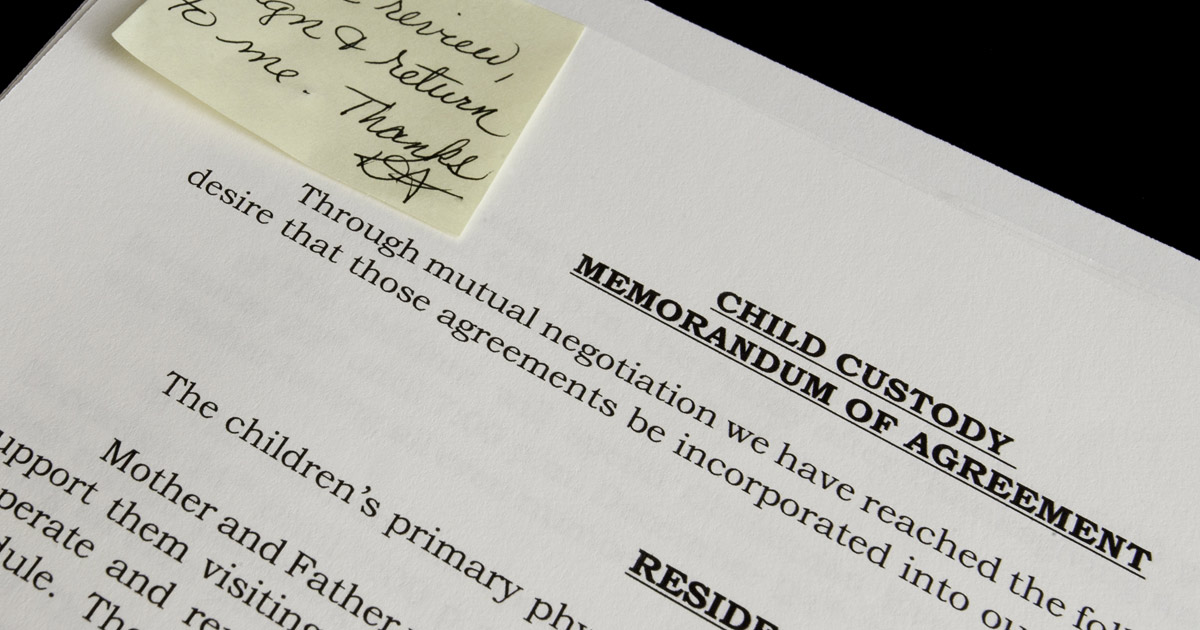Child Custody
Divorce is a stressful event, but when children and child custody arrangements are involved, the stress can be overwhelming. All child custody agreements must be made with the best interests of the child in mind, but decisions can be complicated by resentment, anger, and jealousy between marital partners.
Making these decisions as a team helps parents avoid issues in the future because leaving these decisions to the court is not what either parent wants. Working with a Moorestown child custody lawyer helps record decisions made by the family, and advice is available no matter the circumstances.
It is crucial to find an experienced lawyer that is experienced in handling child custody cases. Committed, dedicated, and professional lawyers will help parents negotiate arrangements that are fair and just. Child custody agreements are not a one-time proposition, and parents must focus on child custody until all their children reach the age of majority. Retaining a lawyer provides parents with guidance as these agreements change, parents move, or remarry.
How is Child Custody in New Jersey Litigated?
There are many factors that go into the development of child custody agreements in New Jersey. Parents must understand that their wishes matter only when creating an agreement without the court’s assistance. Reaching an agreement on custody before going to court helps both parents get what they want. Parents know their children best, and family dynamics make the most sense to the parents and their children.
After reaching this agreement, have a child custody lawyer write up the document for presentation with the petition for divorce. Unfortunately, parents do not always agree on child custody agreements. Parents often believe their spouses are bad for their children, one or both parents plan to move, the children have preferences, and custody agreements become complex due to unforeseen circumstances.
Once a child custody arrangement goes before the court, a judge makes a decision with the best interests of the children at heart, while also ensuring the parents can act on these agreements. There are many factors to consider when making these arrangements.
The overall environment in each home is the first and most important factor in choosing a child custody arrangement. The court may request home studies and review information from each home. For example, a parent managing a home made for children looks better than a parent keeping an unkempt home. Parents who have a history with the Division of Child Protection and Permanency (DCPP) may not receive the preferential treatment they believe they deserve. Additionally, parents must be forthcoming when discussing child custody. Lawyers cannot be surprised with past issues that directly affect the judge’s decision.
The emotional maturity of both parents also factors into their child custody agreement. Parents who are quick to anger may scare their ex-spouse, or they make a bad impression when sitting before a judge. Parents may be asked to attend court-mandated counseling sessions and wait for a report from the therapist. Additionally, while parents should focus on their careers, they cannot allow the stress of their careers to affect their parenting. Parents should not give up their jobs, but they must evaluate how their jobs impacts their family.
The type of relationship shared by parents and children is significant when creating a custody agreement. For example, children may be afraid of one parent due to harsh discipline. Older children have frosty relationships with certain parents because of interactions in the past, and the court should hear these factors. Custody cases may take some time to litigate as the court considers these factors.
The physical and emotional health of each parent impacts their ability to maintain custody. Chronically ill parents deserve visitation, but altering agreement accommodates that parent appropriately. Additionally, mentally ill parents deserve visitation, but they may be supervised or limited given their condition.
The distance between the homes of both parents factors into any custody agreement. For example, parents cannot enter into a nesting agreement when they currently live 100 miles apart. When parents live down the street from one another, more elaborate custody agreements become feasible.
Uncooperative parents cannot maintain a custody agreement as their combativeness indicates they will not abide by a custody agreement. Judges may feel supervised visitation or controlled visitation may be appropriate for parents who make the process difficult for everyone. In extreme cases, combative parents may be held in contempt or even charged with crimes for their outbursts.
Children with special needs must receive visitation in a manner that is appropriate with their condition. Parents must work with the court and each other to help their children live good lives. Getting in the way of this process makes the parent look bad and hurts the children. Older children may also have a preference for which parent to live with, given several factors, including their schooling and personal relationships. Speak to a lawyer about how to argue for child custody and create a compelling case before filing for divorce.
What Types of Child Custody Arrangements Exist?
Parents seeking options for child custody must understand how their custody may be arranged or divided. Parents are free to reach an agreement out of court to expedite the divorce process. While couples come to agreements every day, some couples need help creating a plan that works for the family. In most cases, a hybrid plan is appropriate for the family, given its schedule and changing needs.
There are several types of child custody arrangements available in New Jersey, including:
Joint legal custody: This type of agreement designates one parent as the primary residential custodian, also known as the custodial parent, where the child spends most of their time. Decisions for education, health, and the welfare of the child are shared by the parents, and agreements are based on the best interests of the child.
Joint legal custody is common in New Jersey as one parent generally moves out of the family home while the other remains. Visitation is made simpler as the non-custodial parent is familiar with the location of the family home. Additionally, the children often do not need to move or change schools.
Sole legal and physical custody: This arrangement gives a single parent the responsibility to provide the child’s residence and the power to make all decisions for the child’s education, health, and welfare. This type of arrangement works best when one parent is deemed unfit for reasons relating to child abuse or neglect, substance abuse, mental incapacity, or if they have a history with the DCPP.
Sole legal custody awards involve issues of abandonment, desertion, or frequent absences, but sole custody arrangements can be modified. Reach out to a lawyer for assistance if it is time to petition for custody or the agreement is under review because the non-custodial parent completes requirements laid out by the court.
Shared legal and physical custody: When parents want to share equal amounts of time and decision-making power, this type of arrangement works best. Children can spend alternating weeks with each parent or even split their week between each parent’s home. Decisions regarding the child’s education, health, and welfare are shared equally.
A common form of this custody agreement is nesting, where the parents keep three homes. The family home houses the child and the parent taking visitation at that time. Each parent also keeps a private home where they live when not visiting their child. During amicable divorces, parents may choose to purchase or rent a secondary home they rotate in and out of when not visiting their child in the family home. Advantages of this arrangement include:
- Keeping the child in one home
- Parents have their child’s undivided attention
- Parents need not give up the family home
For assistance, reach out to a lawyer who can explain these custody arrangements. If parents come to an agreement mixing these concepts, present that agreement to the court or a lawyer. The court prefers parents come to agreements on their own, but judges understand that some families need guidance or special circumstances dictate that the court take action.
 How Do I Create a Child Custody Parenting Plan?
How Do I Create a Child Custody Parenting Plan?
Once the type of child custody plan has been decided, parents can begin negotiating a parenting plan. It is important to make a careful assessment of each parent’s reasonable availability when making the parenting plan so that the child’s best interests are served. Child custody plans are often fluid because parents change jobs, move, remarry, and more. Children grow up, and circumstances change. Parents should consider the following:
Work schedules: Do both parents work full-time? How far do they have to travel each day to and from their work location? Is their schedule flexible? How will their work schedules affect their availability? These are important questions to discuss while forming an appropriate parenting plan. Generally, a parent with a firm work schedule offers predictability that helps a parent with an erratic schedule make plans. Parents should inform their employers that they have child visitation obligations, adjust their schedules accordingly, or work with a lawyer to avoid conflicts.
Activities: When children are heavily involved in school and sporting activities, their schedules can be demanding. Each parent must consider if they are able to maintain the child’s busy schedule. Activities involving the children may require trade-offs here and there. For example, a child who plays baseball has practice during the week and games on the weekend. Parents who agreed to weekend visitation may make their exchange around a weekend baseball game. If a visiting parent must take children to activities, the schedule for those activities must be clearly laid out.
Travel: Many jobs require travel. Sometimes, parents can be away from home for days or weeks. Each parent must consider how often their work schedule will keep them away from home and what accommodations they will make for the supervision of their child while they are away for travel or work. A flexible visitation schedule allows parents to make accommodations for travel. Older children may have the capacity to travel with their parent, or parents may need to make additional arrangements. Trusted family friends and extended family may also provide housing or supervision for children to aid both parents.
Childcare: Young children always need to be supervised. Even teenagers need to have an adult presence in their lives each day. Parenting plans need to carefully consider how each child will be supervised in the absence of the parent. Childcare should be arranged before finalizing the divorce. In addition to arranging for childcare, parents must set clear expectations for the supervision of their children. The non-custodial parent must abide by rules set by the custodial parent.
Relatives and extended family relationships: Relationships with grandparents, aunts, uncles, cousins, and close family friends are an important part of a child’s life and development. Parents will need to put personal feelings aside and make arrangements that include spending time with relatives from each side of a child’s family to promote and strengthen these relationships and to preserve family traditions.
What are the Basic Parts of a Parenting Plan?
The basic parts of a parenting plan include:
- Weekly visitation
- Bi-weekly visitation
- Summer visitation
- Holidays
- Birthdays
- Special occasions
- Emergencies
- Communication
Visitation schedules change from family to family. Parents that travel across town for visitation often see their children each week. Parents traveling long distances may only see their children every other week. Summer holidays must be coordinated to help parents spend equal time with the children, and holidays must be arranged as family gatherings are common.
Parents may wish to spend their birthday with their child, and special occasions may be added to the visitation schedule. Parents should raise these concerns when creating the parenting plan. Additionally, parents must know how to handle emergencies. While the non-custodial parent cannot handle the children during all emergencies, they must prepare to help whenever possible. Communication is key when parents create a parenting plan. If parents are not communicating, the court will make these decisions on behalf of the family.
Can Child Custody Agreements Be Modified?
Child custody agreements should be modified when it is clear the current agreement no longer serves the family. Reach out to a lawyer and ask about options to modify the agreement. Parents have several reasons to modify the agreement, including:
Job change or loss: When parents change jobs, adjusting the child custody arrangement is natural. Parents have different schedules, and the new agreement must reflect their new hours. A parent who once worked the third shift and visited their children at odd hours might take a promotion to a nine-to-five position. The agreement changes to benefit everyone.
Moving: Parents who must move should adjust the child custody agreement to reflect a new address, transportation options, and more. In certain cases, parents may petition to block their ex-spouse’s move due to the extreme distance involved or other factors. Consult a lawyer before alleging that an ex-spouse cannot move with or without the children.
Remarriage: When parents remarry, their visitation schedule can change. A new marriage often includes new children in the custody agreement, and both parties must work to help everyone have a fruitful relationship with each child. As children grow up, they may want to change their visitation or live with another parent.
For example, a child living with one parent may want to live with the other parent to go to a certain school. Parents and children may have disagreements over personality or parenting, and the court should review these adjustments. A judge will consult with the children, determine if the family dynamic is fractious, and create a new custody order where appropriate.
Children aging out of child support: Adjusting the order changes the amount the non-custodial parent pays. These children may, however, accept money for schooling or other expenses as part of the child custody agreement.
Misconduct on the part of either parent: This requires an adjustment to the parenting agreement. The court may step in when it is clear one parent is unfit to supervise the children. Children may be afraid to visit certain parents, or other conditions might dictate a change in the custody agreement. While criminal charges are possible, parents must reach out to a lawyer who will push for an immediate adjustment of the custody agreement, potential restraining order, and more.
Do not be afraid to adjust the child custody arrangement. Life happens. No one knows where they will be five years from now as the children grow. Keeping the children happy and the family unit functional often requires small changes a lawyer can make. Ask the children to attend meetings with the lawyer if necessary or request a hearing so that a judge hears the case and makes a determination in the best interests of the children.
Parents should not begin to adjust their custody agreement without speaking to a lawyer or seeking a modification. Assuming that all is well is unsafe for the children, legally precarious, and unwise. The court will not look kindly on parents who simply adjust their child custody agreements without consulting one another or the court.
Does Child Support Affect Child Custody?
Child support and child custody are two different things. Parents often feel as though they must leverage child support and child custody to get when they want. This is not true. Child support orders are litigated separately from child custody. When the court orders child support, it is calculated using rules from the state of New Jersey. Child custody will be fair and equitable for both parties.
If child support is not paid, do not withhold child custody or visitation. Speak to a lawyer about the situation. Withholding child visitation directly violates the court’s custody order. Withholding child support because of issues with visitation is also in direct violation of a court order. Mediation may be required, or the case could be argued before a judge to resolve issues the parents have with the decree or one another.
When Should I Hire a Child Custody Lawyer?
Hire a child custody lawyer when it is clear the marriage is over, or child custody becomes an obstacle for the family. Parents need advice when trying to complete a child custody agreement. Lawyers will speak with the children, create a document suitable for the court, and mediate when necessary. Children deserve to live in a nice home filled with love and kindness. They cannot do that if their parents are arguing over custody or do not make the appropriate choices.
Parents should come back to the lawyer to modify their custody agreements. Do not approach a lawyer to press criminal charges. Ask a lawyer to file for a restraining order or modification, as well as about the ramifications of remarrying or moving.
Moorestown Child Custody Lawyers at Stockton Family Law Help Clients with All Types of Child Custody Issues
If you need to establish child custody arrangements, speak to one of our dedicated Moorestown child custody lawyers at Stockton Family Law. We will guide you through the difficult process of divorce and help you with child custody arrangements. Call us at 856-412-5052 or contact us online for a confidential consultation. Located in Moorestown, New Jersey, we serve clients throughout South Jersey, including Mount Laurel, Burlington County, and Camden County.





